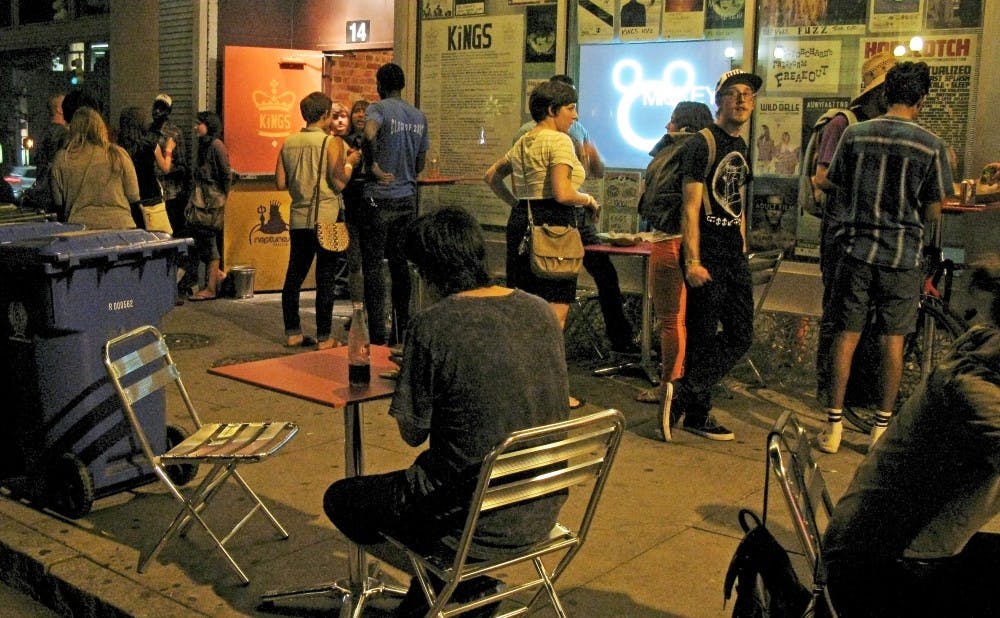SiteWork has developed rapidly since its inception in January 2013. The four founders “laid the groundwork” for SiteWork out of a desire “to see more artist-led, artist-driven initiatives in the Triangle,” said co-founder Lincoln Hancock.
“The four of us each have specific strengths, and we all chipped in equally,” said Harrison Haynes, another co-founder. Both Hancock and Haynes are North Carolina-based artists and musicians. Along with art advisor Chloe Seymore and artist Neill Prewitt, their teamwork reflects “one of [SiteWork’s] explicit goals: bringing the work of Triangle-based artists into the broader conversation in order to encourage collaboration between local and international artists."
One of SiteWork’s eventual objectives is to own a residential space to allow out-of-town artists to live in the Triangle to work on long-term projects.
“This idea of psycho-geography—of being connected not just to a physical environment but also to a mediated environment—is something I explore in my artwork,” said Hancock. Yet SiteWork primarily facilitates the growth of contemporary art within the Triangle.
“The Triangle is where we live, but we’ve also chosen to be here because we see a lot of artistic potential here,” said Hancock. He went on to explain that the SiteWork founders “feel strongly that there is some amazing work being done here, yet the poles of the national and international conversation tend to travel through New York and L.A. even though the South is an increasingly important cultural component of the United States.”
Haynes alluded to the impact of the Hopscotch Music Festival, which took place two weekends ago in downtown Raleigh and brought international bands to play alongside local bands.
“We wanted to mirror that kind of collaboration in a contemporary art context,” said Haynes.
So, they did this at SiteWork’s grand debut—SiteWork/Hopscotch—which offered seven indoor and outdoor art projects within walking distance of the concert grounds.
Fittingly, the “visual work had tones that could be construed as music as well," said Haynes. "Hopscotch weekend was about featuring artists who can be described as dual practitioners, masters of the overlap between music and visual art."
This theme resonates well with one of Haynes’s personal goals: reconciling his pursuit of drumming and visual arts.
“I’m trying to figure out how to combine both without one being the detriment of the other,” he explained. At this point in his artistic trajectory, he sees connections between music and artwork that he had never previously imagined.
Hancock mirrored the importance of discovery in a practical sense.
“We are aware of, learning about and making connections with similar organizations in other parts of the city and region,” he said. “It’s good to know that there are people doing similar things in other cities, but I am unaware of an effort exactly like SiteWork.”
SiteWork’s first major project at SiteWork/Hopscotch may have been a resounding success, but it “was on a shoestring budget. SiteWork is not about making money, but SiteWork needs money,” Hancock explained. “We really appreciated the help of several sponsors who gave us in-kind and material donations.” One of SiteWork’s most pressing goals is raising money for upcoming projects.
“We want to be able to pay artists well for what they do,” said Hancock.
Haynes described how his time at the Rhode Island School of Design prepared him—or failed to prepare him—for his professional career.
“Quickly after graduating from RISD, it became clear that I had to be very resourceful to find employment opportunities,” he said. “You kind of have to be your own businessman, and while I love RISD and credit it with defining my creative practice and sensibility, there was no curricular feature there that offered me the nuts and bolts on how to survive as an artist in the real world.”
This financial aspect of the professional art scene partially explains why SiteWork promotes and facilitates artwork that lacks exhibition venues or local support.
“We ultimately want to provide people with more opportunities to experience contemporary art,” said Hancock. “At the same time, we want to give the artist the kind of support and stability that a gallery can provide, but in the context of innovative exhibition opportunities.”
Hancock feels that the public is becoming more aware of, and interested in, contemporary work.
“The problem is that all of that energy seems to be focused into museum-like institutions," he said. "There are very few independent galleries in the Triangle that feature contemporary art—especially video or performance—since most commercial galleries focus on sellable artwork in order to be financially stable."
SiteWork aims to promote contemporary art in ways that transcend the traditional museum or gallery apparatus. Hancock summed up SiteWork’s mission: “We want to structure opportunities for artists to do contemporary art more effectively and more broadly. And while SiteWork is based in Raleigh, Durham and Chapel Hill, we want to achieve this goal in the context of the nationwide and worldwide art scene.”
SiteWork’s upcoming projects in the Triangle will be announced on a rolling basis. For more information about the organization’s artists, sponsors, and exhibitions, please visit http://siteworknc.com/.
Get The Chronicle straight to your inbox
Signup for our weekly newsletter. Cancel at any time.

